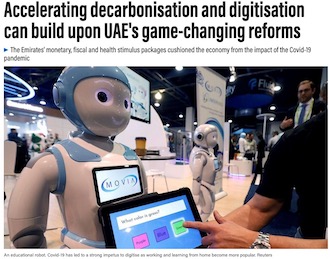The op-ed by Dr. Nasser Saidi, titled “Accelerating decarbonisation and digitisation can build upon UAE’s game-changing reforms“, appeared in The National on 27th Dec 2020 and is reposted below.
Accelerating decarbonisation and digitisation can build upon UAE’s game-changing reforms
Adjusting to Covid-19 has defined this year – from partial or full lockdowns to remote working and stalling global trade, investment and tourism, with cleaner air the rare bright spot.
Hopes of a V-shaped recovery diminished with the emergence of new Covid strain and subsequent lockdowns. Yet, despite the “Great Lockdown” resulting in a deep recession, markets are exuberant amid expectations that the production and distribution of several vaccines will create a path to normality in 2021.
Unlike the global financial crisis from 2008 to 2009, which began as a housing bubble and a demand shock, the current health crisis began as a supply shock that disrupted global supply chains and caused a spillover to the demand side, where it hit trade, tourism and consumption.
Given the widespread impact of the pandemic and despite concerted monetary and fiscal stimulus equal to 12 per cent of global gross domestic product, not only will the road to recovery be longer but the cumulative output loss will be much larger than during the 2008 financial crisis, with long-term scarring of labour markets and economies expected.
The UAE’s combined monetary, fiscal and health stimulus package – equal to 18 per cent of its GDP – cushioned the economy after a demand-induced oil price shock and the effects of a global lockdown.
After several weeks of movement restrictions and stringent health measures, the UAE’s public health system proved effective and resilient, allowing the economy to reopen earlier than regional peers.
While maintaining social distancing and applying Covid-19 protocols to keep the community safe, the UAE reopened offices, businesses, allowed tourists to enter and successfully held events and conferences – both online and on site. This bodes well for the delayed Expo 2020 Dubai and the resumption of tourism.
With the reverberations of Covid-19, the UAE’s policy reforms were spot on – from the game-changing 100 per cent foreign ownership of businesses to the remote working initiative to the retirement and 10-year residency visas for skilled professionals – amid the country’s intentions to become a knowledge-based, innovative economy.
Liberalisation and market access reforms are set to attract foreign investment, boost capital flows to the property market, enhance workforce skills and support innovation and productivity growth.
With energy market volatility and lingering coronavirus-induced uncertainty, what activities can drive an economic recovery next year and support medium-term growth prospects?
For GCC oil producers, de-risking fossil fuel assets by following a strategy of part-privatisions and public-private partnerships in energy reserves, upstream and downstream operations and related infrastructure such as pipelines is important. This has started with Adnoc and Aramco.
With the oil price required to balance budgets higher than current prices, deficit financing instruments should be developed by governments. We can expect new government bonds to be issued next year that will encourage more corporate bond issuances and private debt placements.
The UAE is accelerating its decarbonisation efforts, focusing on energy efficiency, transitioning to renewable energy and building on its leadership in renewable energy projects and investment in climate risk mitigation and adaptation.
Greater investment in agriculture technology for food security, which includes sustainable vertical farming and desert agriculture, should take place in tandem with the sustainability and energy efficiency drive.
Decarbonisation and the diversification of the energy mix will support the growth of the UAE’s capital markets through the issuance of green bonds and sukuk, as well as the financing of PPP and privatisation deals for renewable energy and clean technology.
Indeed, the UAE can become a regional, if not a global, centre for renewable energy finance.
Covid-19 has led to a strong impetus to digitise as working and learning from home became more popular. The UAE should build on its strong e-commerce and e-services base by massively investing in 5G to support the Internet of Things and building smart cities and infrastructure.
This is critical for the retail sector to move online from brick-and-mortar shops. Liberalising the telecoms sector and lowering the costs of broadband services will help the country become a fully digitised economy and a regional hub for digital services.
The UAE has world-class core infrastructure in transport and logistics, power and telecoms. These assets can serve infrastructure-poor countries in the region, East and Central Africa, India, Pakistan and Central Asia. Electricity from solar power can be exported through cross-country, integrated grids.
Finally, the UAE’s normalisation of relations with Israel heralds a new regional economic geography: new trade and investment opportunities, as well as the reduction of geopolitical tensions.






